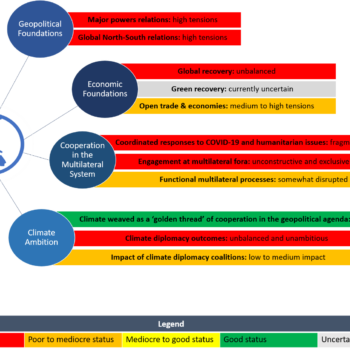No matter what we might wish for, there is no getting back to normal after the pandemic. What we might have had in mind – stability and prosperity for all – has not been our normal for a long time. Instead, the world has been through several decades of systemic crises and they are here to stay.
To transform our economies for a fair, climate-safe society, we must accept that systemic crises are a feature of the way we run our economic and social systems. We must plan for these crises while working towards the transformation we want to see; adjusting policymaking and accounting for how politics responds to crises.
Let’s consider former German Chancellor Angela Merkel, the dominant European politician of recent decades, whose career has been characterised by the tableau of crises she faced, including:
- 2007-2008 global financial crisis
- 2009 Eurozone crisis
- EU border crisis from 2014
- COVID-19 crisis from 2020
- The all-encompassing climate crisis
Extraordinary reactions needed to stabilise each situation. The introduction of quantitative easing was a radical step in the aftermath of the financial and eurozone crisis; the suspension of the Dublin Regulation for the border crisis, allowing Syrian refugees to enter Germany; the (temporary) abandonment of fiscal rules for the COVID-19 crisis. Yet in each case, the reactionary response was an attempt to quickly get “back to normal”.
We need policies that prepare for systemic crises, but policymakers employ reactive solutions, ignoring underlying risks that could cause the next crisis. For instance, one key learning from the 2007-2008 financial crisis was to introduce countercyclical buffers, to help increase equity in economically stable times. A good idea in principle, but policymakers severely underestimated the likelihood of the next crisis. In Germany, the mechanism only came into effect in mid-2019 – too late to mitigate the financial impact of COVID-19.
Arguably, none of the crises we refer to have been resolved. Moreover, the reactions themselves brought problems. The massive bailouts and quantitative easing post-2008 and during 2020/21 have increased the wealth discrepancies that are destabilising the economy and society. The number of billionaires worldwide increased by 700 in 2021, to a total of more than 2700.
This systemic breakdown is also happening to the world’s climate and biodiversity. As a significant amount of the financial system funds emission-heavy industries, this will likely turn into economic and financial crises, sooner rather than later. Natural catastrophes have increased manifold in recent history: the economic losses incurred from 2000-2019 were almost double the size of the previous 20 years.
Systemic crises call for political action at a system level
Politics likes to deal with certainties and is most comfortable dealing with the immediate. There is a distinct political attention cycle that shows how attention deviates rapidly, even after major events. The news and political cycles are already moving on from this summer’s heat domes in western North America and catastrophic floods in Germany, China and Nepal. The only time massive public money has been spent over the past 15 years was in response to unforeseen crises, followed by intense austerity.
This attention cycle exacerbates the reactive nature of crisis response. Post-2008, austerity policies were an attempt to restore a pre-existing order, and failed to address the ongoing nature of the economic and environmental crisis. In addition, once public attention wanes, vested interests have an easier ride. The 2010 Dodd-Frank-Act, for instance, was an impressive piece of legislation but lobbyists diluted it during the implementation process.
Even in the EU, politics is national by nature. There is a tendency to seek solutions that work in-country, and not see crises as cross-border. It took COVID-19 to introduce even a modicum of European solidarity through limited debt mutualisation.
Making use of systemic crises
Any policy proposals aimed at social and ecological transformation need to account for the crisis-prone nature of our system to be successful. They should also use the political bargaining opportunity of systemic crises, and the growing recognition of the valid role of the state, to create a major policy shift. Any far-reaching proposal, say for greater monetary or fiscal coordination, or a global carbon tax, could become politically credible cornerstones as a crisis response.
In a crisis, reactive politics can rapidly become reactionary politics. Neither will help us prevent crises, nor foster the transformation needed. Therefore, a systemic change requires overcoming vested interests that hinder the transition.
You will be able to read more on these ideas in this paper by Ronan Palmer, E3G and Michael Peters & Dr Gerhard Schick, Finanzwende / Heinrich-Böll-Foundation. The paper is part of the Transformative Responses Project and a cooperation between Finanzwende, E3G and the Heinrich-Böll-Foundation.


